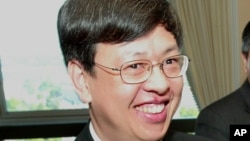The front-runner for Taiwan’s 2016 presidential election, opposition candidate Tsai Ing-wen, has named prominent epidemiologist Chen Chien-jen as her running mate.
In her announcement Monday, Tsai praised Chen, who was Taiwan’s health minister from 2003 to 2005, for leading the battle against the 2003 SARS outbreak.
“You will ask me why I have selected Mr. Chen, the vice president of the Central Research Academy, as my running mate. I believe the vice president is an important post of our country. So no need to ask why I have picked him, and you should ask what kind of person is needed by this country to fill this position," she said.
Chen, 64, is a native of Taiwan. Although he is not a member of the opposition Democratic Progressive Party (DPP), Chen has closely worked with DPP policymaking groups for the past seven years.
When accepting Tsai’s offer, Chen said Taiwan was “facing a critical moment” and that he was obligated to serve.
“Whether we walk toward paradise or hell, brightness or darkness, continued recession or reforms, all this will be decided in the January vote," Chen said.
The DPP ticket will face Eric Chu, the presidential candidate of the ruling Kuomintang (KMT). Chu is widely expected to announce former Labor Affairs Minister Wang Ju-hsuan as his running mate on Wednesday.
Taiwan’s presidential and legislative elections are set for January 16. Polling indicates the DPP is ahead in both contests.
The Kuomintang suffered its worst local election defeat last year, partly because of its Beijing-friendly policies.
Since current President Ma Ying-jeou came to power in 2008, Taiwan has seen improved relations and more trade with mainland China, but many voters feel the policy has led to focusing on the mainland market and has made the island vulnerable to China’s economic slowdown.
A backlash against economic deals with China sparked mass street protests in March 2014 and has given the chief opposition party candidate a lead in opinion polls ahead of the election.
To try to boost support for the KMT, Ma held a historic summit with mainland Chinese leader Xi Jinping this month. Some analysts, however, said they thought the summit achieved too little to change voter sentiment.
Some KMT lawmakers said in a news conference Monday that they thought Chu’s recent visit to the U.S. indicated the United States supported Ma's policy to maintain cross-strait peace, and that the U.S. was doubtful of DPP policies.
"When DPP was in power, their words and deeds before and after the election were very different," said KMT lawmaker Lin Yu-fang. "As a result, the relations of Taiwan and mainland China became intense, which made the United States very nervous.”
But DPP legislators responded by arguing the U.S. pays more attention to the transparency of Taiwan’s cross-strait policy.
“When there is no transparency, can people trust you? Do they believe you? Because of the opacity, people have taken a conservative attitude, which is a bad phenomenon,” said DPP lawmaker Hsu Tian-tsai.
U.S. officials have said Washington will not pick sides between Chu or Tsai, who visited the U.S. in June.
This report was produced in collaboration with the VOA Mandarin service.




